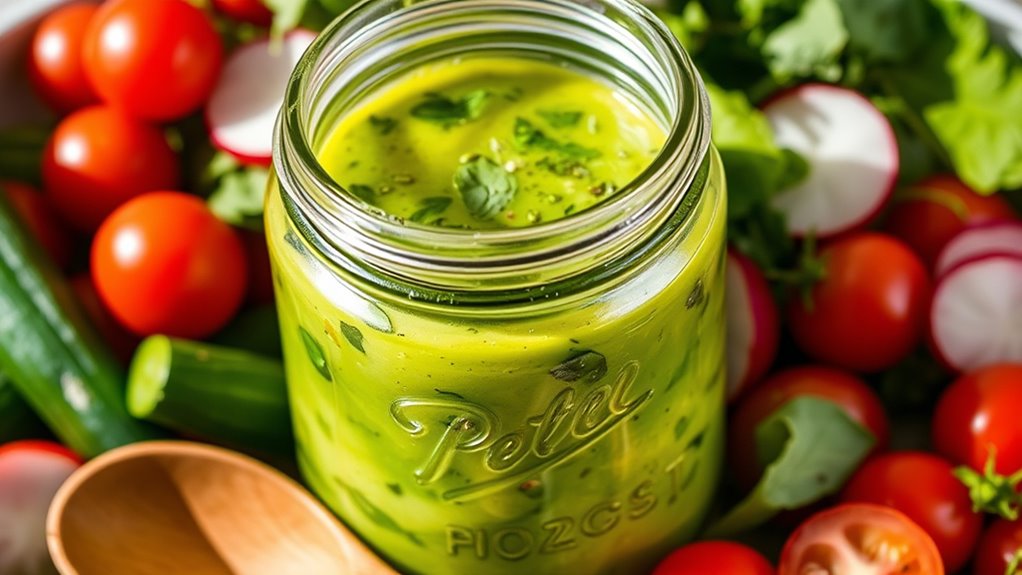This Pete’s Place Salad Dressing blends smooth mayo with bright white wine vinegar, a splash of lemon, and a whisper of Dijon for a silky, tangy finish. You whisk until it’s creamy and light, then drizzle olive oil in a steady stream to emulsify. Adjust with a pinch of salt, maybe a pinch of garlic or onion powder. Spoon this just before you toss greens, and you’ll taste how the dressing elevates every bite—there’s more to discover if you keep going.
Ingredients and Quantity
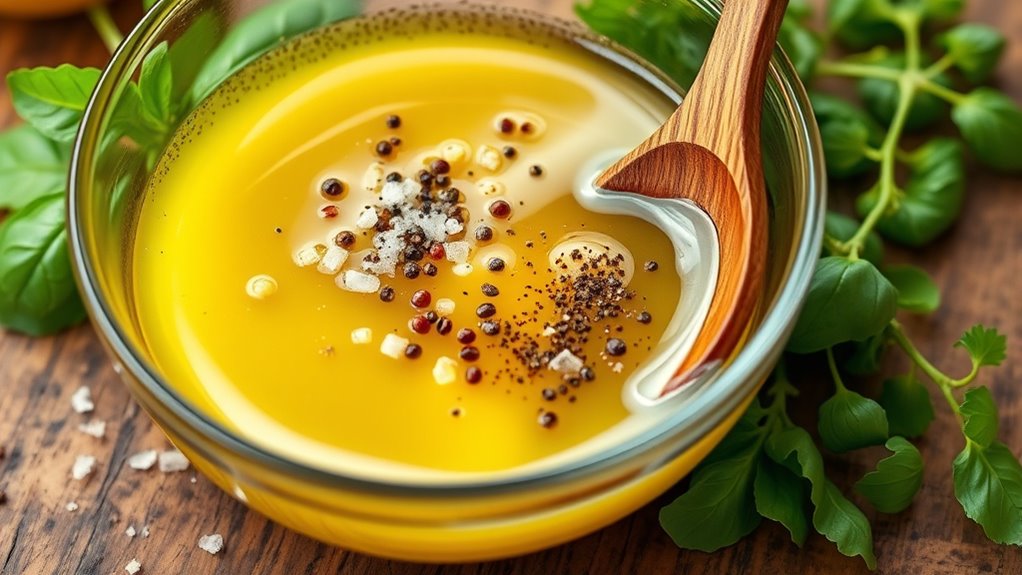
Here are the ingredients you’ll need, measured for one batch of Pete’s Place Salad Dressing: 1/2 cup mayonnaise, 2 tablespoons white wine vinegar, 1 tablespoon lemon juice, 1 teaspoon Dijon mustard, 1/2 teaspoon sugar, 1/4 teaspoon garlic powder, 1/4 teaspoon onion powder, a pinch of salt, and a pinch of black pepper.
| Base | Optional Fresh Herbs | Flavor Variations |
|---|---|---|
| Mayo + acids | basil, chives | lemon zest, dill |
| Dijon + sugar | parsley | garlic oil, pepper |
| Salt & pepper | tarragon | hot sauce, paprika |
| cilantro | horseradish, curry | |
| oregano | smoked paprika |
Preparations
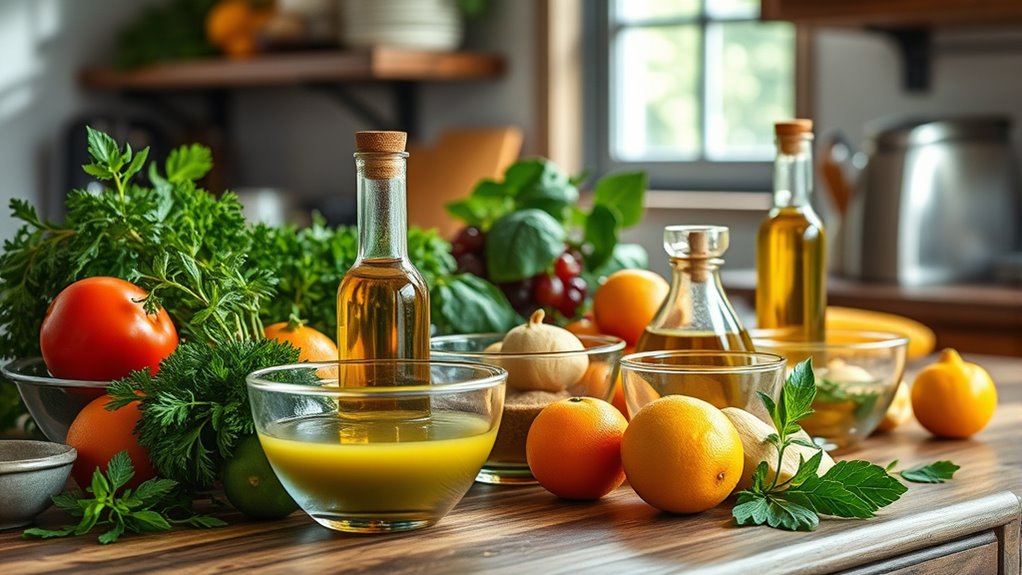
Start by gathering all the prep-ready components: smooth mayonnaise, tangy white wine vinegar, bright lemon juice, and Dijon mustard, plus a light sprinkle of sugar, garlic powder, onion powder, salt, and pepper. You’ll whisk with purpose, not hesitation, until emulsification glides smoothly. Measure ingredients with clean precision, then taste as you go, adjusting acidity and sweetness to your silhouette of freedom. Set everything within reach, and plan for quick, decisive timing: mayonnaise first, vinegar next, lemon juice brightening, mustard tying it all. Preparation techniques matter here: slow drizzle, steady whisk, and a moment to rest so flavors mingle. Ingredient sourcing matters too—fresh, high-quality components yield a crisper bite. You control the balance, crafting a dressing that mirrors your bold, unshackled palate.
Kitchen tools or Kitchenware Required
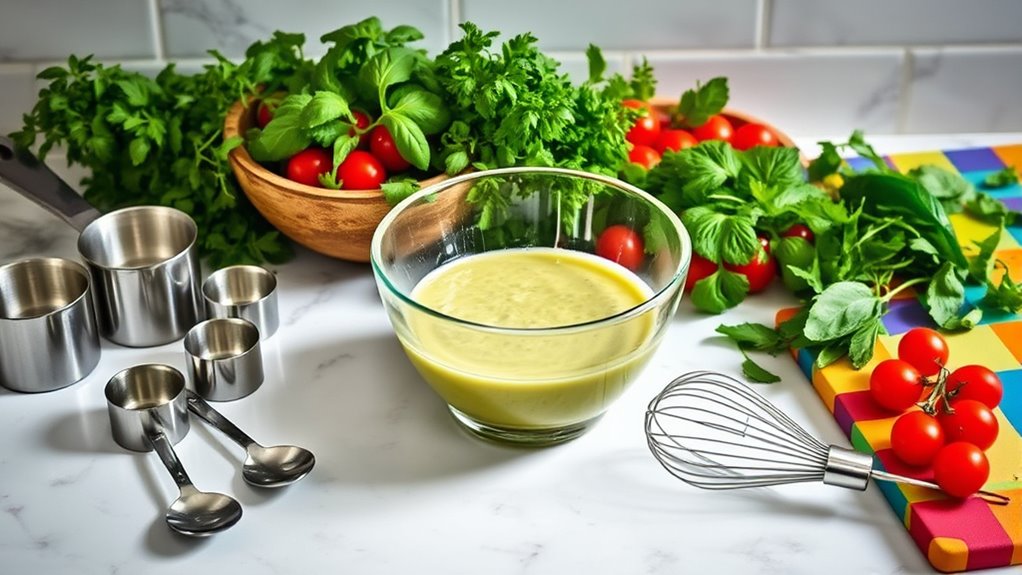
A basics-only lineup keeps this dressing honest and fast: a smooth whisk, a sturdy bowl, and a small measuring cup or spoon for clean precision. You’ll want mixing bowls that fit your bold kitchen vibe, measuring spoons that snap back with accuracy, and a trustworthy spatula for scraping every ounce. Keep things simple, sturdy, and sunny.
| Tool | Purpose | Bonus |
|---|---|---|
| Mixing bowls | Whisk and blend smoothly | Multiple sizes stay ready |
| Measuring spoons | Precision for tangy balance | Close your eyes to judge by feel |
| Whisk | Aerate and emulsify | Gentle constant motion |
| Spatula | Scrape and transfer | Keeps nothing behind |
Freedom tastes better when your gear is reliable, efficient, and ready.
How to Cook
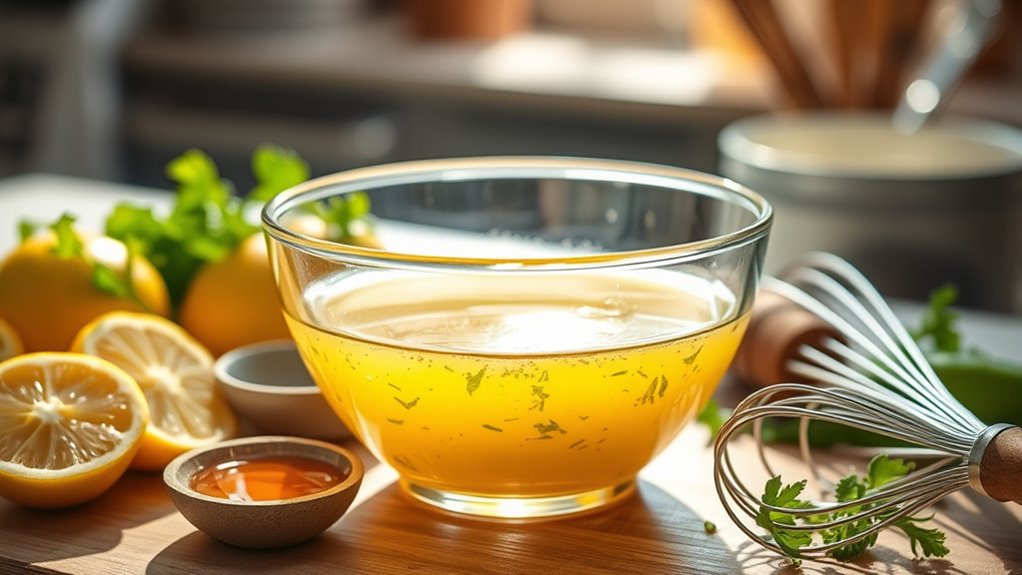
- Start with a calm mise en place: gather your gear, measure your liquids, and set a small bowl near your whisk.
- Whisk with confidence, then slowly fold in olive oil in a steady stream to emulsify.
- Add vinegar or lemon juice for brightness.
- Season with salt for balance.
- Add a touch of honey or mustard to bind flavors.
- Keep your pace deliberate and taste as you go to ensure every note lands true.
- Explore salad variations by adjusting herbs, citrus zest, or crushed garlic to suit your mood.
- Know your dressing types: creamy, vinaigrette, or yogurt-based, and tailor textures accordingly.
- Aim for a crisp, vibrant dressing that complements greens without overpowering them.
- Embrace freedom within clean measurements and decisive, flavorful restraint.
How to Serve
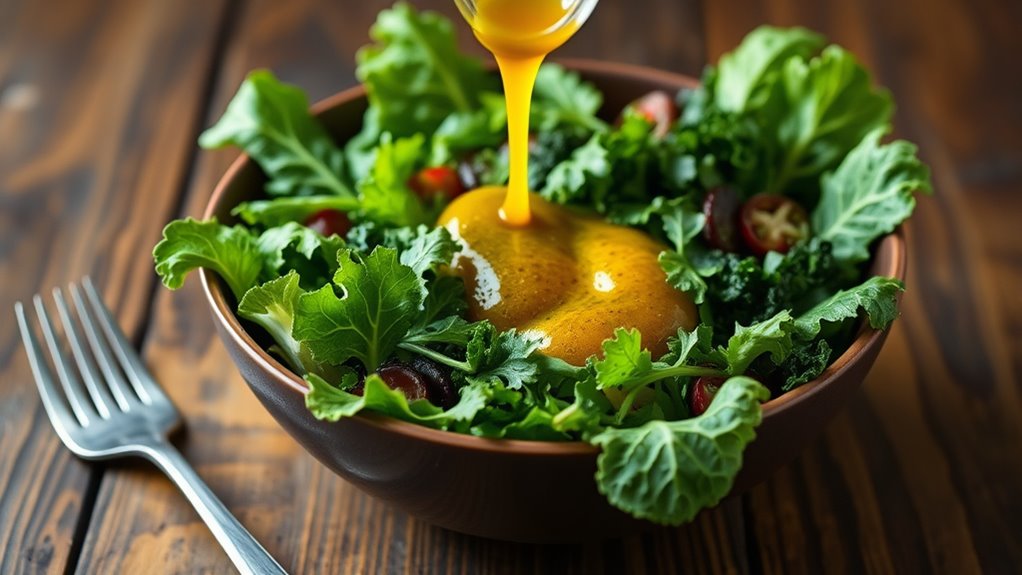
Serve it smartly: spoon or pour the dressing just before tossing, so greens stay crisp and catch every bright note. You’ll want to drizzle in thin streams, then lift the bowl to distribute with confidence, not soggy overwhelm. When you plate, consider a generous greens-to-dressing ratio, then finish with a quick toss to coat each leaf evenly. Serving suggestions lean into contrast: a sturdier romaine with tangy vinaigrette, peppery arugula kissed by citrus, or kale mellowed with a touch of sweetness. Flavor pairings shine—lemon, Dijon, or honey play off the dressing’s brightness without overshadowing it. Keep it simple: let the greens speak, let the dressing amplify, and savor the crisp, vibrant bite that follows.
Tips
Start with a clean workspace and organized ingredients, because a smooth flow matters as much as the dressing itself. You’ll reveal confident prep by labeling jars, measuring spoons aligned, and clearing spatulas within reach. When you taste, adjust with restraint: a pinch more salt, a whisper of honey, a dash of lemon to brighten. Keep a journal of tweaks so your signature mix stays repeatable. For salad variations, think texture: crunchy greens, silky cucumbers, or peppery arugula—each deserves a complementary drizzle. For faster days, master dressing alternatives like a quick citrus swap or a creamy yogurt riff, keeping balance intact. Rely on clean ratios, vivid contrasts, and your palate’s memory to tailor every bowl you serve.
Food Value and Benefit
Pete’s Place salad dressing offers a nutrient-rich addition to your meals, enhancing both flavor and health benefits. Made with wholesome ingredients like olive oil, fresh herbs, and lemon juice, this dressing supports overall wellness while adding vibrant taste.
Pete’s Place salad dressing enhances meals with olive oil, fresh herbs, and lemon juice for vibrant, wellness-forward flavor.
Benefits of eating this recipe include:
- Supports heart health with healthy monounsaturated fats from olive oil.
- Promotes skin vitality through antioxidant-rich herbs and vitamin C from lemon juice.
- Aids digestive health by providing fiber and beneficial compounds from fresh herbs.
- Provides sustained energy without blood sugar spikes thanks to balanced fats.
- Supplies essential vitamins and minerals such as vitamin E, vitamin K, vitamin C, calcium, and potassium.
Enjoy Pete’s Place salad dressing as a versatile, nourishing boost to greens, grains, or vegetables, turning everyday meals into healthy rituals.
Frequently Asked Questions
Can I Substitute Dairy in This Dressing?
Yes, you can substitute dairy with dairy alternatives. Try almond milk or cashew cream for creaminess, olive oil for body, or tahini for depth. Experiment with herbs, lemon, and vinegar to explore flavor variations and freedom.
How Long Does It Last in the Fridge?
If you store it properly, it lasts about a week in the fridge. Picture a milk jug that stayed cold: fridge-temp stability matters. Shelf life hinges on ingredients; follow storage tips, keep airtight, label, and refrigerate promptly.
Can I Freeze Dressing for Later Use?
Yes, you can freeze dressing for later use. Use freezing methods like airtight storage containers or freezer bags, leave headspace, and label clearly. Thaw slowly in the fridge, then whisk to regain texture and flavor after freezing.
Is It Gluten-Free if Using Tamari?
Tamari can be gluten-free, but check labels for gluten ingredients; if not, use Tamari alternatives. You’ll craft a gluten-free dressing with clear, vibrant flavors, embracing freedom while you mix Gluten free ingredients, proving your palate stays boldly adventurous like sunlight.
What Pairs Best With This Dressing on Salads?
You’ll pair it best with crunchy greens and vibrant salads, embracing bold flavor combinations and fresh textures. Think cherry tomatoes, cucumbers, avocado, quinoa, or chickpeas—Salad toppings that let the dressing shine in every bite.
